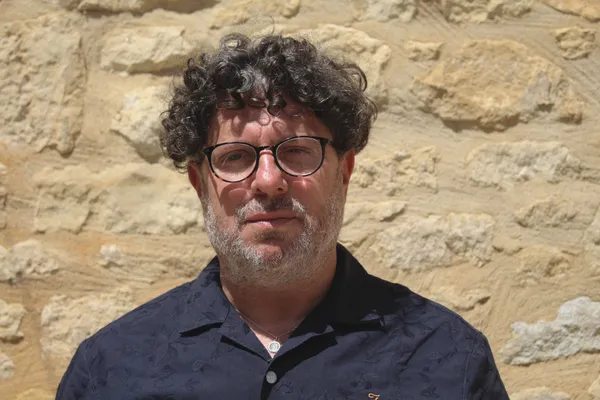 |
| Marc Isaacs |
Marc Isaacs' This Blessed Plot showcases the director's playful interest in exploring the language of film. Setting it in the quaint English village of Thaxted, Essex, Isaacs and writer Adam Ganz combine documentary and fiction into what the director describes as a "documentary fiction pageant."
The story revolves around Lori, a young Chinese filmmaker who visits Thaxted, and encounters Keith, who appeared in Isaacs' previous film, The Filmmaker's House. Following the death of his wife, Keith has swapped London for village life – along with his extensive collection of Arsenal memorabilia. Exploring the village, and its sense of Englishness, Lori learns about a former vicar who espoused Christian socialism, observes traditional Morris dancing, and discovers the dead continue to live alongside the living.
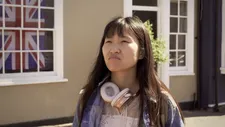 |
| Lori exploring England |
In conversation with Eye For Film, Isaacs discussed transitioning to questions of storytelling and mythology, countering the instinct to explain, and British film culture’s lack of vision.
Paul Risker: What was the genesis of the idea for This Blessed Plot and how does it relate to your previous work?
Marc Isaacs: […] In the early days of thinking about a new film, I thought about doing something else with Keith [who was in The Filmmaker's House]. I was interested in how a solid masculine figure might be if he were stripped away a little. What would he be like if he lost his wife and was in a more vulnerable situation? So that was some of the early thinking.
For the last few years, I've been teaching documentary film at UCL and there's an extraordinary number of students from China. I don't know if you're aware of that - in universities generally but especially in London based ones, there are a lot of Chinese students paying £30,000 a year for masters' courses. It's an extraordinary amount of money and for many of them it's the first time they've been away from China. It’s the first time they've left their families and they're also children of the one child policy, even though that doesn't exist now. They come over and they end up in my classroom and others. I ask them to go out into the world with a small camera and make a film.
It's interesting because they're discovering this country of ours. Often, they'll stay around Central London where we're based - it's hard to get them to go to different places, but sometimes they do wander off and discover other parts of the country. I suppose I was thinking about that and the premise of a film where a Chinese student filmmaker is discovering England.
So, I had these two ideas running, and in the early days I thought maybe this student filmmaker [Lori] could be lodging with Keith, who had met her father at an Arsenal game in China. It’s funny, because when we suggested it, Lori said she'd never live with someone like that, and we dumped the idea.
These were the early traces [of the film] and there's also the question of the economic situation - what kind of film can be made for a similar budget to The Filmmaker’s House? What are the possibilities? In the early days Adam Ganz, the writer and I went to speak to Keith, and he'd just recently moved out to Thaxted. Before we went to see him, the idea of Thaxted didn't even exist in our minds – it was pure coincidence.
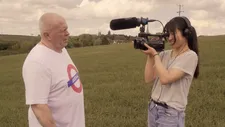 |
| Lori meets Keith |
Keith was up for doing another film and we started to think about where he was living and discovered so much about that town - the church and the history of Christian socialism, and the traditions of Morris dancing. It broadened the idea into a story that might be about this Chinese filmmaking student encountering Keith. It would be a bereaved man to something broader, tapping into all these themes and myths of England.
Another early idea was to do with ghosts, which grew out of the sense of discovering this town and thinking about how you discuss things that don't exist - how do you bring that town’s rich history into the film?
Keith's wife [Sue] not being present led to us to maybe bring her into the film as a ghost and I started thinking about people I'd filmed before, who remain as kind of ghosts in a sense. I've recorded these very specific moments in these people's lives, and they're immortalised in that moment. I started to think about film as a ghost in itself and ghosts on film.
PR: Some cultures believe a photograph takes part of a person’s soul. It’s similar to your idea of film capturing these immortalising moments in the life of an actor.
MI: […] It was interesting to think about the material I had of these characters and how it might inform the story we tell - what bits to use, what not to use. We thought a lot about that, and we were also curious about this question of what it means to be filmed. It's like a reverse Boyhood. The actors are filmed year after year, there's a progression there in aging, whereas This Blessed Plot is in reverse.
PR: To talk about time, we have a warped view of cinema because the filmmakers we view as modern are part of cinema's infancy.
MI: […] The Filmmaker’s House dealt with questions of documentary truth and authenticity, and performance. This Blessed Plot is dealing with questions of storytelling and mythology - a filmmaker bringing these people together to explore myths in their own lives and country. The next film is in its early days, but Adam and I are thinking about fakery and artificial intelligence, in terms of how it has completely changed the nature of how we can look at non-fiction and fiction film.
We are both aware that while This Blessed Plot of course has a narrative, our interest was in those gaps that will hopefully position the audience to think about the filmmaking, and why certain things are being done. When we discovered The Ripe Earth, [the] film that the Boulting brothers made in the town in the 1930s, we were just using the odd clips of the vicar, but then we realised, like you do when you go to places as a filmmaker, you research the town, and Lori could be watching this.
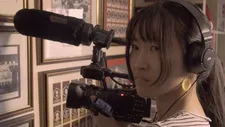 |
| A trip to the museum |
Even The Ripe Earth is documentary fiction because they would have people lugging huge cameras into the fields to film the peasants, with this voice of God narrator explaining everything. They were also probably asking people to do things. We thought a lot about all of this and the spaces in the film with the archive material. In these moments you can think about how the filmmakers are piecing together the story and why certain things are being chosen.
PR: One of the themes of the film is the idea of Englishness. It’s an interesting question to ask at this time because there's an argument to be made that some, not all, sought a return to a nostalgic version of England in the Brexit referendum. Many of us are interrogating this concept of Englishness in these transformative years, and Lori brings a foreign point of view to this conversation.
MI: We were aware of all those possibilities, that they were part of the town’s Christian socialism past, or that Thaxted would have been a Brexit voting town. It’s interesting with Lori because she would tell us about her ideas of England before coming here. When she went to stay at Thaxted for a few days on her own with her little camera, to get a sense of the place, some of the material is in the film. After a week there, things started to fall away, and she could see different sides to the place. Her impressions, that were one dimensional are probably like ours of China.
We thought about the uncle character as a kind of embodiment of Thatcherism, who is out for himself, and how Keith is very much a man who desires certainty. Those ideas were floating around but we didn't want to talk about them too directly. Like in The Filmmaker’s House, I've always been interested in the idea of what Englishness is, and the fractures and the gaps. It also relates to the words on Susan's headstone that Keith chooses: “Reason to believe.” It seems to me that the film is about how people need something to believe in and hold onto.
For all of us, when you talk about what you want the country to be, the times we're living in, it’s a mess - where do you start? For people that aren't intellectualising and are just living their lives, I think they do need to root themselves in something. It really doesn't matter if it's true or not, and the church [in the film] symbolises that.
It’s strange to see Morris dancing inside the church –a form of dancing that apparently might have come from the Moors [laughs]. It's always a reinterpretation or reconstitution to fit the times we're living in now, to serve a particular purpose.
PR: One scene I immediately recall is Keith showing Lori his Arsenal memorabilia, which introduces the idea of respecting history. This Blessed Plot allows its audience to freely engage with the ideas and themes, without the director guiding their attention.
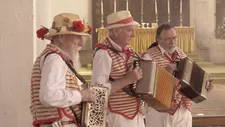 |
| The Morris dancers |
MI: That's certainly a reflection of my character; I've always been interested in questions more than answers. Who knows what the answers are. There are so many different responses you can have for these things, and they're reflections and provocations. I had great fun during the sequence where Keith is quoting from Richard II. You're choosing bits of archive to play around with. The Queen had just died, and it was interesting to think about what bits of the Queen we could use - what words, prose and verse? Just thinking about archival material in a humorous way can provoke thoughts about that kind of stuff.
It's important to let the film raise things and not determine what people should be thinking. There was a sound designer who was absolutely against opening the film with characters being made up as it were and introduced in that way. I felt strongly that it puts the audience in a position to think about the construction of the film - what are the filmmakers doing here? They’re not professional actors, they're being brought into this pageant. We call it a documentary fiction pageant that tells a particular kind of story. It provokes thought in that way and doesn’t open like a conventional film when it's not.
PR: I was recently watching Ingmar Bergman's The Hour Of The Wolf, and while there’s an example of breaking the fourth wall, in comparison This Blessed Plot isn’t so traditionally direct in doing this but is more playful.
MI: I filmed some material of the characters in their real lives talking about how they feel about playing a ghost or playing a character. I thought that could maybe be in the film, but it feels that trope has become very conventional. If you watch any Netflix documentary, it starts off with them fiddling about with a radio mic.
“Are you ready now?” “Okay, I'm ready.” “We can start.”
It has become conventional in itself. Adam and I were watching this Bergman film, where it cuts to Liv Ullmann talking about her character, then it cuts back into the narrative. When it was made, probably in the Sixties, it would have been very radical and interesting. It still does feel interesting because it's in that context, but we were thinking a bit more how we could create that distance.
PR: Discussions about docu-drama and docu-fiction are timely when we consider how topical the idea of controlling the narrative is, and the value of truth in contemporary media, culture and society. Genre cinema typically emphasises the anxiety of the time, but this is something cinema is able to engage with more broadly.
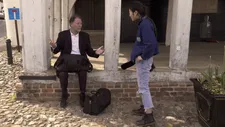 |
| An awkward situation |
MI: It's interesting when you talk about the anxiety of the time because in response to The Filmmaker’s House, there were always one or two people in the audience that would get angry that I pulled the rug from underneath their feet. It would lead to interesting discussions about how people see truth because when you watch a documentary, you just buy into it. This is an important discussion to provoke. I don't know if they were angry at me or at the film for making them reassess, but that was obviously the point of it. We wanted to do that in a different way in this film and not to repeat ourselves.
PR: Having now finished This Blessed Plot, has the distance influenced how you see the film?
MI: I've understood things about it with that distance that I wouldn't have understood a few months ago. It’s not interesting for me to define what we were trying to do in terms of whether the film is rough and ready in some ways, or how successful it is. I don't look at it like that. It's more about understanding what we were trying to do, and what bit resonated and what bit didn't and carry that through to the next project. When I say that, I mean the risk-taking curiosity to try and find different ways to tell stories and to not fall into traps that your mind automatically pushes you towards, probably out of insecurity and anxiety. I'm like the audience, in that it takes a bit of effort to remind yourself that you don't have to explain everything, especially in our culture where everything is over explained.
A student of mine this term made a film that's really ambiguous. It's a series of images that for me aren't at all nailed down - there’s a sort of lost love theme to it. When the other students in the group watched it, some asked, “What’s this about?” I thought the most interesting thing they had to ask themselves was that question.
As adults and more experienced filmmakers, we often try to narrow things down far too much. Especially in British film culture, a lot of the films are about issues or they're talking to classic kitchen sink realism traditions. It seems quite dull that we're working and thinking in that way. Why are we stuck in that mode? I think it has a lot to do with funding and the rest of it. If you come along with an original idea, funders always want to prefer it to something they know, which of course changes it entirely.
This Blessed Plot is released in UK cinemas from 26th January by Verve Pictures.





















